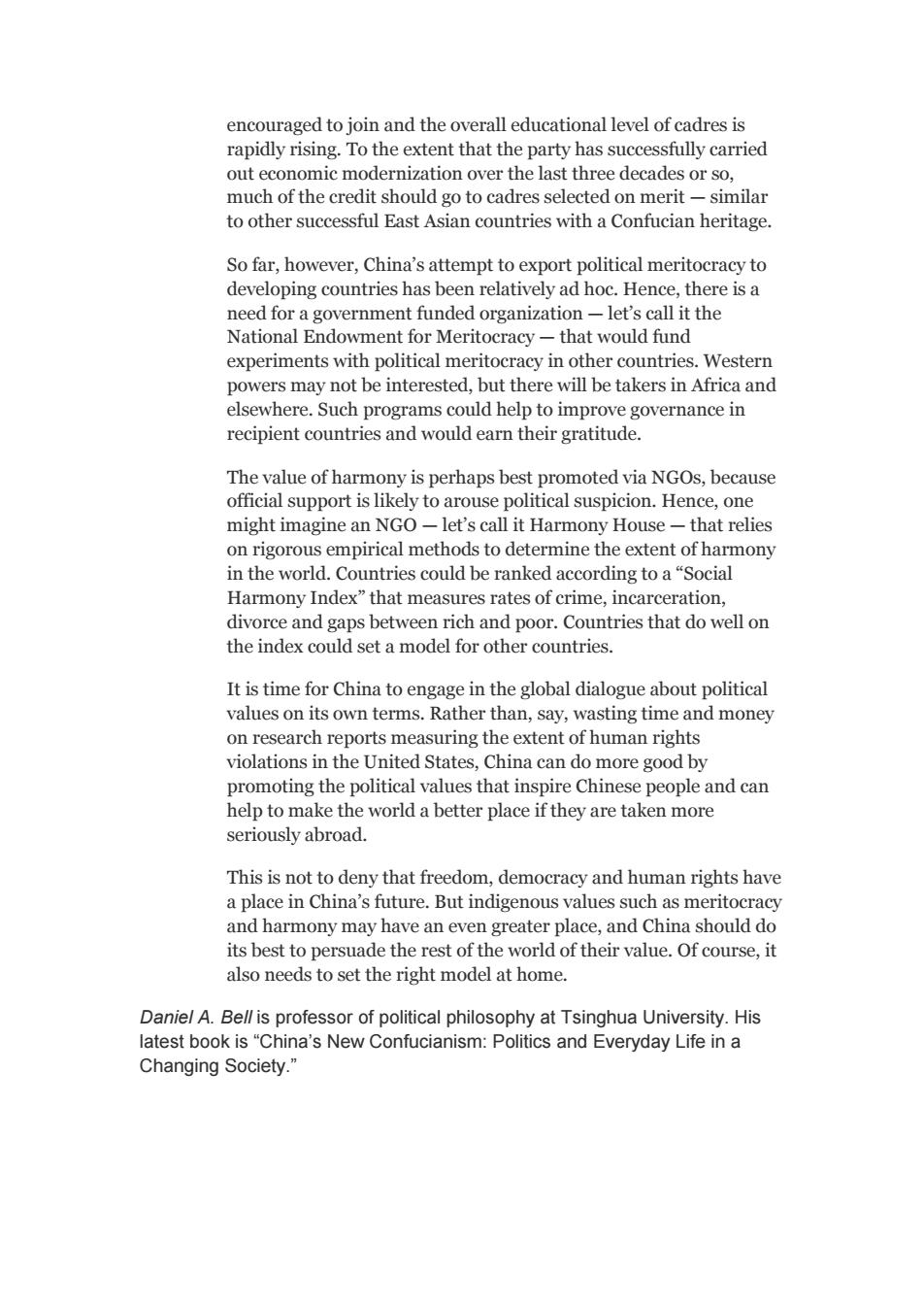正在加载图片...

encouraged to join and the overall educational level of cadres is rapidly rising.To the extent that the party has successfully carried out economic modernization over the last three decades or so, much of the credit should go to cadres selected on merit-similar to other successful East Asian countries with a Confucian heritage. So far,however,China's attempt to export political meritocracy to developing countries has been relatively ad hoc.Hence,there is a need for a government funded organization-let's call it the National Endowment for Meritocracy-that would fund experiments with political meritocracy in other countries.Western powers may not be interested,but there will be takers in Africa and elsewhere.Such programs could help to improve governance in recipient countries and would earn their gratitude. The value of harmony is perhaps best promoted via NGOs,because official support is likely to arouse political suspicion.Hence,one might imagine an NGO-let's call it Harmony House-that relies on rigorous empirical methods to determine the extent of harmony in the world.Countries could be ranked according to a"Social Harmony Index"that measures rates of crime,incarceration, divorce and gaps between rich and poor.Countries that do well on the index could set a model for other countries. It is time for China to engage in the global dialogue about political values on its own terms.Rather than,say,wasting time and money on research reports measuring the extent of human rights violations in the United States,China can do more good by promoting the political values that inspire Chinese people and can help to make the world a better place if they are taken more seriously abroad. This is not to deny that freedom,democracy and human rights have a place in China's future.But indigenous values such as meritocracy and harmony may have an even greater place,and China should do its best to persuade the rest of the world of their value.Of course,it also needs to set the right model at home. Danie/A.Bell is professor of political philosophy at Tsinghua University.His latest book is"China's New Confucianism:Politics and Everyday Life in a Changing Society."encouraged to join and the overall educational level of cadres is rapidly rising. To the extent that the party has successfully carried out economic modernization over the last three decades or so, much of the credit should go to cadres selected on merit — similar to other successful East Asian countries with a Confucian heritage. So far, however, China’s attempt to export political meritocracy to developing countries has been relatively ad hoc. Hence, there is a need for a government funded organization — let’s call it the National Endowment for Meritocracy — that would fund experiments with political meritocracy in other countries. Western powers may not be interested, but there will be takers in Africa and elsewhere. Such programs could help to improve governance in recipient countries and would earn their gratitude. The value of harmony is perhaps best promoted via NGOs, because official support is likely to arouse political suspicion. Hence, one might imagine an NGO — let’s call it Harmony House — that relies on rigorous empirical methods to determine the extent of harmony in the world. Countries could be ranked according to a “Social Harmony Index” that measures rates of crime, incarceration, divorce and gaps between rich and poor. Countries that do well on the index could set a model for other countries. It is time for China to engage in the global dialogue about political values on its own terms. Rather than, say, wasting time and money on research reports measuring the extent of human rights violations in the United States, China can do more good by promoting the political values that inspire Chinese people and can help to make the world a better place if they are taken more seriously abroad. This is not to deny that freedom, democracy and human rights have a place in China’s future. But indigenous values such as meritocracy and harmony may have an even greater place, and China should do its best to persuade the rest of the world of their value. Of course, it also needs to set the right model at home. Daniel A. Bell is professor of political philosophy at Tsinghua University. His latest book is “China’s New Confucianism: Politics and Everyday Life in a Changing Society